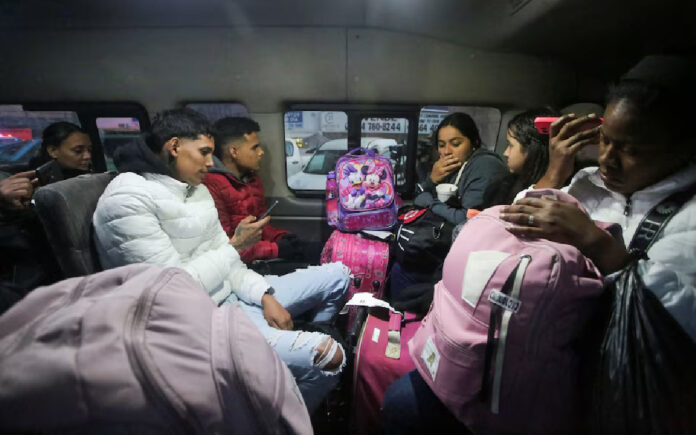Washington/Piedras Negras: On Monday, President Donald Trump initiated a major immigration crackdown, enlisting the U.S. military for border security and taking bold steps to limit asylum access and curb birthright citizenship. Declaring illegal immigration a national emergency, Trump issued sweeping orders aimed at bolstering border enforcement, including directing the Pentagon to support border wall construction, expand detention facilities, and assist in migrant transportation.
The new measures empower the U.S. Secretary of Defense to deploy military personnel to the border as needed. Trump, who regained the presidency with a promise to strengthen border security, has repeatedly criticized President Biden for the rise in illegal immigration during his predecessor’s time in office. However, as Biden implemented stricter immigration policies last year and Mexico increased enforcement efforts, the number of illegal border crossings saw a dramatic decline.
Republicans argue that large-scale deportations are necessary due to the millions of immigrants who crossed into the U.S. illegally under Biden’s administration. Estimates suggest the number of immigrants in the U.S. illegally or with temporary status was around 11 million at the start of 2022, with some analysts now putting the figure closer to 13 to 14 million.
“As commander-in-chief, I have no higher responsibility than to defend our country from threats and invasions, and that is exactly what I am going to do,” Trump stated in his inaugural address.
However, Trump’s mass deportation plans have drawn significant criticism. Immigrant rights advocates warn that such actions could disrupt businesses, tear families apart, and impose a significant financial burden on U.S. taxpayers. The American Civil Liberties Union (ACLU) filed a federal court motion on Monday, challenging Trump’s decision to terminate the CBP One program, which provided asylum seekers with their only avenue for asylum at the U.S.-Mexico border.
A Reuters/Ipsos poll in December indicated that while Americans have become less welcoming to undocumented immigrants since Trump’s first term, there is still considerable opposition to extreme measures such as the use of detention camps.
Biden Entry Program Suspended
The day after Trump took office, several migrants in Mexican border cities found their appointments on the CBP One app canceled. As of January 7, approximately 280,000 individuals had been using the app daily to secure appointments to enter the U.S.
In Ciudad Juarez, many migrants scrambled to find temporary housing and arrange transportation back home. Daynna del Valle, a 40-year-old Venezuelan who had been waiting for eight months, saw her appointment for the following day canceled. “I’m lost,” she said, explaining that she could barely send money back to her sick mother in Colombia.
Denia Mendez, a Honduran migrant in Piedras Negras, Mexico, opened her email minutes after Trump’s inauguration and read the cancellation notice. Mendez, visibly distressed, shared the news with other migrants who were also facing uncertainty. “They’re not going to let you into the app, baby,” Mendez softly told her daughter, who continued to try accessing the system.
Birthright Citizenship Under Attack
One of Trump’s executive orders focused on birthright citizenship, directing U.S. agencies to refuse citizenship to children born in the U.S. without at least one U.S. citizen or permanent resident parent. The order, which took effect within 30 days, quickly sparked a legal challenge. The ACLU and other groups filed a lawsuit in New Hampshire, arguing that the move violated the 14th Amendment’s Citizenship Clause.
“Denying citizenship to U.S.-born children is not only unconstitutional — it’s also a reckless and ruthless repudiation of American values,” said ACLU Executive Director Anthony Romero.
Also Read | Hotel Inferno in Turkey’s Bolu Mountains: 66 Dead, 51 Injured
Trump also moved to suspend U.S. refugee resettlement for at least three months and called for a review of security measures to determine if travelers from certain countries should be banned. Additionally, he rolled back existing guidance for U.S. Immigration and Customs Enforcement (ICE) officers, expanding their authority to target individuals with final deportation orders, a step likely to accelerate deportations.
The administration also made efforts to strengthen control over U.S. immigration courts, including firing four top officials. Trump announced that his administration would pursue the designation of criminal cartels as foreign terrorist organizations and would use the Alien Enemies Act of 1798 to target foreign gang members.



